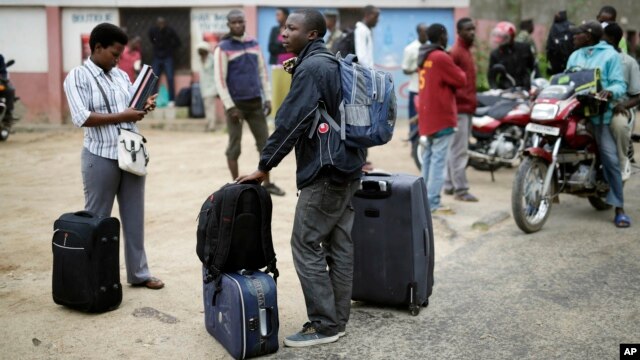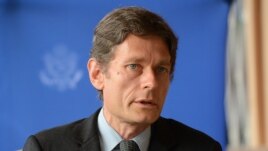
A senior U.S. diplomat told Burundian President Pierre Nkurunziza on Thursday that the east African country risks boiling over if it smothers political opposition, as protests against the president entered a fifth day.
Burundi unexpectedly closed its national university in the wake of political protests against the nomination of incumbent Nkurunziza to run for a third term.
Reports say the university in Bujumbura shut its doors on Thursday and sent home the students living in residence halls on campus.
At least five people have died in the protests that erupted after Saturday's controversial nomination, as police clashed with the hundreds of protesters that have marched in the streets in the days since then.
Critics of the nomination say allowing the incumbent president to run for a third term is unconstitutional.
According to reports by Reuters, Tom Malinowski, U.S. assistant secretary of state for democracy, human rights and labor, arrived on Wednesday to try to prevent unrest from escalating and defuse the country's biggest crisis in years, set off by Nkurunziza's decision to seek a third term in office.
After meeting Nkurunziza, Malinowski told reporters he had urged him to allow peaceful criticism and room for political opposition before the June 26 vote.
"I left the president with the thought that this country with its very complicated and difficult history is like a boiling pot, and that if you try to put a lid on that pot it doesn't stop boiling. It risks boiling over," Malinowski said.
On Tuesday U.N. Secretary-General Ban Ki-moon announced he is his sending a special envoy for the Great Lakes Region, Said Djinnit, to Burundi to hold talks with the president, other government officials, and political party leaders.
The U.N. chief has called on security services to exercise restraint, and for all parties to reject violence and avoid inflammatory speech.
The United Nations refugee agency says more than 5,000 Burundian civilians have crossed into Rwanda since the weekend. It says most are women and children, who say they experienced intimidation and threats of violence related to the upcoming presidential election.
The protests began a day after the ruling CNDD-FDD party nominated Nkurunziza to run for the third term. The president's eligibility comes down to the wording of a peace agreement and the constitution.
Burundi's existing political structures were founded on the 2000 Arusha agreement, which brought to an end the civil war between Hutu and Tutsi factions that killed up to 300,000 people. That agreement says the president can serve no more than two terms in office.
But the 2005 constitution states the president must be elected through “universal direct suffrage,” interpreted to mean a popular vote. Nkurunziza was elected by parliament to his first term, so his supporters argue he is eligible to run again.
President Nkurunziza has faced revolt from within his own party over his presumed candidacy. Seventy-nine members of the ruling party wrote the president last month asking him not to seek office.
His government has been under fire from rights groups and the international community for excluding the opposition and silencing voices of dissent.
Rights groups have accused the ruling party of arming its youth wing, known as the Imbonerakure, and using them to attack opponents in the past. Human Rights Watch last month said members of the group assisted the police and military in executing 47 people following a confrontation with an unnamed armed group in northwestern Cibitoke province.
The international community, including the United Nations, the United States and the African Union, has urged Burundian political actors to respect the rule of law and hold fair elections.





Post a Comment